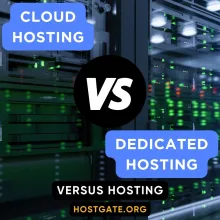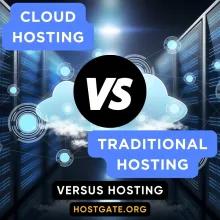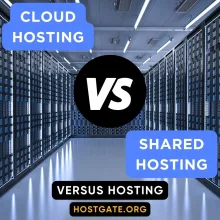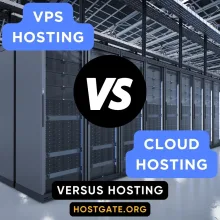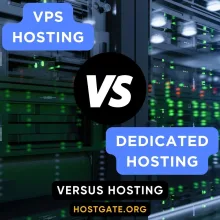Shared Hosting vs VPS Hosting – Which One is Better? | HostingVS
The choice between shared and VPS hosting is crucial for website success. Shared hosting functions like a communal living space, offering cost-effective solutions ideal for small websites and beginners, with prices ranging from $3-15 monthly. VPS hosting provides dedicated virtual environments with guaranteed resources and enhanced control, starting from $20-100+ monthly.
While shared hosting suffices for personal blogs and small business websites with stable traffic, VPS hosting better serves e-commerce sites, high-traffic blogs, and business-critical applications. The decision should consider factors like budget, technical expertise, expected traffic, security requirements, and scalability needs. Recent technological advancements have improved both options – shared hosting now offers better resource isolation, while VPS solutions have become more user-friendly. Both types continue to evolve, with VPS offering superior performance and security, though at a higher cost and technical requirement.

 Experience the Most Affordable and Reliable Cloud Web Hosting Cloud Web Hosting Starting at Just $3.99/month! - Unlimited Storage & Traffic - Free Domain Included - 24/7 Expert Support - Dedecated & VPS Hosting Plans |
Shared Hosting vs VPS Hosting | Shared Hosting | VPS Hosting |
Resource Allocation and Performance | Multiple websites share CPU, RAM, and storage resources on a single server, which can lead to the "noisy neighbor" effect when other sites experience traffic spikes | Provides guaranteed dedicated resources in a virtual environment with enhanced isolation, delivering consistently better performance and handling traffic spikes more effectively |
Security Features | Inherently carries more risks due to the shared environment, though basic security measures are included | Offers superior security through better isolation, customizable security configurations, and greater control over implementing additional security measures |
Management Complexity | Requires minimal technical knowledge as providers handle most server-related tasks, ideal for beginners | Demands more technical expertise or budget for managed services, comes with a steeper learning curve but offers greater control and customization options |
Scalability and Growth | Offers limited upgrade paths and may struggle with traffic spikes | Resources can be adjusted quickly to match growing needs, making it more flexible for scaling websites and applications |
Cost Structure | More economical, typically costing $3-15 per month, making it budget-friendly for smaller websites | Higher price range of $20-100+ monthly, but offers better value for growing businesses through enhanced capabilities and dedicated resources |
Shared Hosting vs VPS Hosting: Which Is Right for Your Website?
In today’s digital landscape, choosing the right web hosting solution is crucial for your website’s success. The hosting market continues to evolve, offering various options for different needs. Among these, shared hosting and VPS (Virtual Private Server) hosting stand out as the most popular choices. Before diving into the specifics, it’s essential to understand that neither option is universally superior – each serves different purposes and comes with its own set of advantages and limitations.
The Shared Hosting Experience
Shared hosting operates like a communal living space where multiple websites share resources on a single server. Shared hosting has become more sophisticated, offering improved resource allocation and management systems. However, the fundamental challenge remains: your website shares CPU, RAM, and storage with other sites. While providers have implemented better isolation techniques, the “noisy neighbor” effect can still impact performance when other sites on the server experience traffic spikes. The major advantage is cost-effectiveness, making it an attractive option for smaller websites and beginners.
VPS Hosting: Your Virtual Private Space
VPS hosting has seen significant advancements in virtualization technology. It creates a dedicated virtual environment within a physical server, offering guaranteed resources and enhanced isolation. Unlike shared hosting, VPS provides root access and the freedom to customize your server environment. The choice between managed and unmanaged VPS services allows users to balance control with convenience. Container-based virtualization, particularly using technologies like Docker and Kubernetes, has become increasingly popular due to its efficiency and scalability.
Cost-Benefit Analysis
When it comes to pricing, shared hosting remains the more economical choice, typically ranging from $3 to $15 per month. VPS hosting starts higher, usually from $20 to $100+ monthly, depending on resources and management level. However, the true cost comparison must consider hidden expenses like SSL certificates, control panel licenses, and backup solutions. VPS often provides better value for growing businesses through dedicated resources and enhanced capabilities, despite the higher initial investment.
Security Considerations
Security has become increasingly critical in these day’s threat landscape. VPS hosting offers superior security through better isolation and customizable security configurations. While shared hosting providers have improved their security measures, the shared environment inherently carries more risks. Both options typically include basic DDoS protection and malware scanning, but VPS users have more control over implementing additional security measures and configuring firewalls according to their specific needs.
Performance and Scalability
Performance differences between shared and VPS hosting have become more pronounced in 2025. VPS consistently delivers better performance due to dedicated resources and the ability to optimize server configurations. Shared hosting can still perform well for smaller websites but may struggle during traffic spikes. The key advantage of VPS is scalability – resources can be adjusted quickly to match growing needs, while shared hosting offers limited upgrade paths.
Management and Technical Requirements
The management aspect often becomes the deciding factor for many users. Shared hosting requires minimal technical knowledge, as providers handle most server-related tasks. This makes it ideal for beginners and small business owners who prefer to focus on their content rather than server management. VPS hosting, especially unmanaged solutions, demands more technical expertise or the budget for managed services. The learning curve for VPS management can be steep, but it offers greater control and customization options.
Migration and Growth Considerations
Transitioning between hosting types has become more streamlined, but it still requires careful planning. Moving from shared to VPS hosting involves transferring files, databases, and configurations. Modern hosting providers often offer migration assistance, but the process can still be complex. It’s essential to consider future growth when making the initial hosting choice to avoid frequent migrations.
Ideal Use Cases and Recommendations
Shared hosting remains ideal for:
- Personal blogs and portfolios
- Small business websites with stable traffic
- Budget-conscious projects
- Beginners in web hosting
- Basic WordPress installations
VPS hosting is better suited for:
- E-commerce websites
- High-traffic blogs
- Business-critical applications
- Development environments
- Websites requiring specific server configurations
Making the Final Decision
The choice between shared and VPS hosting should be based on several factors:
- Budget constraints and resource requirements
- Technical expertise or availability of technical support
- Expected traffic patterns and growth projections
- Security requirements and compliance needs
- Performance expectations and scalability requirements
Expert Tips for Success
Regardless of the chosen hosting type, implement these best practices:
- Regular performance monitoring and optimization
- Comprehensive backup strategies
- Security hardening through proper configurations
- Resource usage monitoring
- Regular updates and maintenance
- Content delivery network (CDN) integration
Looking Ahead
Both hosting types continue to evolve. Shared hosting providers are implementing better resource isolation techniques, while VPS solutions are becoming more user-friendly. Consider your current needs but also factor in future growth when making your decision. Remember that you can always upgrade from shared to VPS hosting as your website grows and requires more resources.
The key is to balance your immediate needs with future growth potential while considering your technical capabilities and budget constraints. Whether you choose shared or VPS hosting, ensure your provider offers reliable support and has a track record of staying current with technological advancements.
Summary and FAQs
How much more expensive is VPS hosting compared to shared hosting, and is it worth the extra cost?
I can break down the cost comparison and value proposition:
Price Ranges:
- Shared Hosting: $3-15 per month
- VPS Hosting: $20-100+ per month
This means VPS hosting is typically 3-8 times more expensive than shared hosting. However, the value proposition isn’t just about the base price. Here’s why the extra cost might be worth it:
Worth the cost if you need:
- Guaranteed resources without “noisy neighbor” effects
- Better performance and reliability for high-traffic sites
- Root access and customization options
- Enhanced security through isolation
- Scalability for growing businesses
- Ability to customize security configurations
Not worth the extra cost if you:
- Run a small personal blog or portfolio
- Have stable, low-traffic websites
- Are just starting out
- Don’t need technical customization
- Have limited technical expertise
- Are operating on a tight budget
When considering the total cost, remember to factor in hidden expenses that weren’t included in the base price:
- SSL certificates
- Control panel licenses
- Backup solutions
- Technical support (especially for unmanaged VPS)
Can I upgrade from shared to VPS hosting without losing my website data?
Yes, you can upgrade from shared to VPS hosting without losing data. According to the 2025 article, the migration process has become more streamlined, though it still requires careful planning. Here’s what you need to know:
The Migration Process:
All your content can be transferred, including:
- Website files
- Databases
- Configurations
Key Points About Migration:
- Most modern hosting providers offer migration assistance
- The process can still be complex despite improvements
- Proper planning is essential to avoid downtime
- Many hosts now provide automated migration tools
Best Practices for a Smooth Transition:
- Create a complete backup before starting
- Choose a low-traffic time for the migration
- Document your current configurations
- Test your website thoroughly after migration
- Keep your old hosting active until the new setup is confirmed working
Important Consideration: It’s better to choose your hosting type with future growth in mind to avoid frequent migrations. While migration is possible, it’s still a process that requires careful planning and execution.
Do I need technical expertise to manage a VPS server?
Yes, VPS hosting generally requires technical expertise, though there are two important paths you can take:
Unmanaged VPS:
- Requires significant technical knowledge
- You’ll need to understand:
- Server administration
- Security configurations
- Software updates and patches
- Resource monitoring
- Troubleshooting
Managed VPS:
- Requires minimal technical knowledge
- The hosting provider handles:
- Server maintenance
- Security updates
- Technical configurations
- Basic troubleshooting
- But costs more than unmanaged VPS
The learning curve for VPS management can be steep, especially for unmanaged solutions. However, you have options depending on your situation:
If you lack technical expertise, you can:
- Choose a managed VPS solution
- Hire a system administrator
- Invest in learning server management
- Start with shared hosting until you’re ready
If you’re willing to learn:
- Start with basics like control panel usage
- Gradually learn more advanced configurations
- Use provider documentation and support
- Consider taking online courses in server administration
Will my website load faster on VPS compared to shared hosting?
VPS hosting generally provides better performance than shared hosting, but let me break down the specifics:
Performance Comparison:
VPS offers consistently better performance because:
- You get dedicated resources (CPU, RAM, storage)
- No competition with other websites
- Ability to optimize server configurations
- Resources can be adjusted as needed
Shared hosting performance can be inconsistent because:
- Resources are shared with other websites
- “Noisy neighbor” effect can impact speed
- Traffic spikes on other sites can slow your site
- Limited control over server optimization
However, important nuances to consider:
- A small website on shared hosting might load just fine
- A poorly optimized VPS could perform worse than well-managed shared hosting
- The actual speed difference depends on:
- Your website’s size and complexity
- Traffic levels
- Server configuration
- Geographic location of the server
- How well you optimize your VPS
While VPS consistently delivers better performance potential, the actual improvement depends on proper configuration and optimization.
Which hosting type is more secure for an e-commerce website?
VPS hosting is more secure for e-commerce websites. Here’s the detailed security breakdown:
VPS Security Advantages:
- Better isolation from other websites
- Custom security configurations possible
- Full control over security measures
- Ability to implement specific security protocols for e-commerce
- Better protection for sensitive customer data
Shared Hosting Security Limitations:
- Inherently riskier due to shared environment
- Limited control over security settings
- Vulnerable to issues from neighboring sites
- Less flexibility for custom security measures
E-commerce Specific Security Considerations:
- VPS is specifically recommended for e-commerce in the article because:
- Handles sensitive payment data
- Requires PCI compliance
- Needs custom SSL configurations
- Demands robust backup systems
- Requires regular security updates
Both types include:
- Basic DDoS protection
- Malware scanning
- Standard security features
However, VPS gives you the additional ability to:
- Configure custom firewalls
- Implement specific security protocols
- Add extra security layers as needed
- Monitor and respond to threats directly

